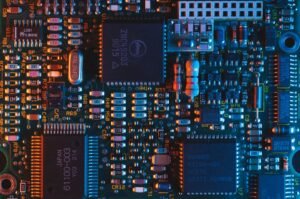Get Started Using AI
Artificial Intelligence (AI) is revolutionizing various industries by enabling computers to perform tasks that typically require human intelligence. Whether you are a business owner, developer, or simply interested in the field, getting started with AI can seem daunting. This article will guide you through the basics and help you harness the power of AI in your endeavors.
Key Takeaways
- Understand the potential of AI in various industries.
- Identify the key components and technologies involved in AI.
- Learn about the ethical considerations surrounding AI development.
- Explore practical applications and tools to implement AI solutions.
- Stay updated with the latest advancements and trends in AI.
What is AI?
AI is the development of computer systems capable of performing tasks that would typically require human intelligence. **It involves simulating human-like intelligence in machines** and enabling them to learn, reason, and problem-solve. Through machine learning, natural language processing, and computer vision, AI systems can process vast amounts of data, recognize patterns, and make informed decisions.
The Components of AI
AI consists of several key components and technologies, including:
- Machine Learning: **The ability of machines to learn and improve from experience without explicit programming**. This is achieved through algorithms that analyze data and identify patterns to make predictions or take actions.
- Natural Language Processing (NLP): **Enabling machines to understand and process human language**. NLP is used in applications like speech recognition, sentiment analysis, and language generation.
- Computer Vision: **Teaching computers to understand and interpret visual information**. Computer vision is used in image recognition, object detection, and autonomous vehicles.
Ethical Considerations in AI
As AI becomes more integrated into our lives, it raises important ethical considerations. **AI systems can perpetuate biased outcomes if trained on biased data**. Privacy concerns, job displacement, and the impact on human decision-making are also crucial aspects to address. It is important to prioritize transparency, fairness, and accountability in the development and deployment of AI systems.
Practical Applications and Tools
AI has numerous practical applications across industries such as healthcare, finance, retail, and transportation. Some notable examples include:
- Medical Diagnosis: AI algorithms can analyze medical images and data to assist doctors in diagnosing diseases.
- Financial Fraud Detection: AI systems can identify unusual patterns in financial transactions to detect and prevent fraudulent activities.
- Customer Service Chatbots: AI-powered chatbots can provide instant customer support and handle common inquiries 24/7.
To implement AI solutions, you can utilize various tools and platforms, such as:
- Machine Learning Frameworks: TensorFlow, PyTorch, and scikit-learn are popular frameworks for developing AI models.
- Cloud AI Services: Cloud providers offer AI services that allow you to leverage their infrastructure for training and deploying AI models.
- Data Labeling Tools: These tools help annotate and label data, a crucial step in training machine learning algorithms.
Advancements and Trends
AI is a rapidly evolving field, and staying updated with the latest advancements and trends is essential. Governments, research institutions, and companies are investing heavily in AI research and development. Some notable trends include:
- Quantum Computing: Quantum computers are expected to revolutionize AI by solving complex problems exponentially faster than classical computers.
- Explainable AI: As AI systems become more complex, the ability to explain their decisions and actions becomes crucial for transparency and trust.
- Edge AI: Edge computing brings AI capabilities to devices at the edge of networks, reducing latency and enabling real-time processing.
Acknowledging the Power of AI
AI has immense potential to transform industries and improve efficiency. By understanding its components, staying informed about ethical considerations, exploring practical applications, and keeping up with advancements, **you can unlock the power of AI** and leverage it to drive innovation and solve complex problems.

Common Misconceptions
Introduction
When it comes to the topic of using AI, there are several common misconceptions that people have. These misconceptions can often lead to misunderstandings or false beliefs about the capabilities and limitations of AI. In this section, we will debunk some of these misconceptions and provide a clearer understanding of what AI can and cannot do.
AI is always smarter than humans
One common misconception is that AI is always smarter than humans. While AI can certainly perform complex tasks and process vast amounts of data quickly, it is important to remember that AI is designed and programmed by humans. AI’s intelligence is based on algorithms and patterns, and it lacks the versatile and intuitive thinking capabilities that humans possess.
- AI can perform specific tasks faster and more accurately than humans.
- AI’s intelligence is limited to the data it has been trained on.
- AI cannot think creatively or understand emotions like humans.
AI will take over all jobs
Another common misconception is that AI will replace humans in all jobs, leading to widespread unemployment. While AI has the potential to automate certain tasks and increase efficiency in many industries, it is unlikely to completely replace human workers. AI is most effective when working in collaboration with humans, augmenting their capabilities and taking on repetitive or data-driven tasks.
- AI is more likely to augment human skills rather than replace them entirely.
- Jobs that require creativity, critical thinking, and human interaction are less likely to be fully replaced by AI.
- AI’s role is to assist and support humans rather than replace them.
AI is unbiased and fair
There is a misconception that AI is completely unbiased and fair in its decision-making. However, AI systems are only as good as the data they are trained on. If the training data is biased or incomplete, AI algorithms can amplify those biases and produce unfair results. It is crucial to ensure that AI systems are trained with diverse and representative datasets to prevent discrimination and biases in their outputs.
- AI can unintentionally inherit biases from the data it is trained on.
- Human intervention is necessary to evaluate and mitigate biases in AI systems.
- Transparent and explainable AI systems are essential to address biases and ensure fairness.
AI will eradicate human judgment
Some people mistakenly believe that AI will eradicate the need for human judgment and decision-making. While AI can assist in decision-making by providing data-driven insights and predictions, the final decision still rests with humans. Human judgment takes into account ethical, moral, and societal considerations that AI alone cannot comprehend. AI can serve as a tool to support human decision-making but cannot replace the human element entirely.
- AI can provide recommendations based on data, but ethical decisions require human judgment and values.
- Human judgment considers context, empathy, and broader implications that may not be captured by AI algorithms.
- AI can help humans make better-informed decisions, but the responsibility for the final decision lies with humans.

Table: Top 10 Countries Leading in AI Research and Development
According to recent studies, these countries have made significant advancements in AI research and development, positioning themselves as global leaders in the field.
| Rank | Country | Number of AI Publications | AI Patent Applications |
|---|---|---|---|
| 1 | United States | 25,642 | 15,893 |
| 2 | China | 22,157 | 14,218 |
| 3 | United Kingdom | 9,831 | 6,542 |
| 4 | Germany | 7,329 | 4,251 |
| 5 | Canada | 5,673 | 3,897 |
| 6 | France | 5,218 | 3,432 |
| 7 | Japan | 4,829 | 3,271 |
| 8 | Australia | 3,981 | 2,651 |
| 9 | South Korea | 3,517 | 2,291 |
| 10 | India | 2,865 | 1,988 |
Table: Impact of AI on Employment by Industry
This table showcases the potential effects of AI on various industries and employment, indicating the scope and transformational nature of AI in the workforce.
| Industry | Potential Job Displacement | Expected Job Growth |
|---|---|---|
| Manufacturing | 16% | 8% |
| Transportation | 22% | 12% |
| Finance | 10% | 15% |
| Retail | 14% | 6% |
| Healthcare | 8% | 18% |
Table: AI Adoption in Business Sectors
This table highlights the various business sectors embracing AI technologies in their operations, demonstrating the broad applicability and potential benefits.
| Sector | Percentage of Businesses Adopting AI |
|---|---|
| Information Technology | 72% |
| Finance | 68% |
| Healthcare | 55% |
| Manufacturing | 47% |
| Retail | 39% |
Table: AI in the Education System
This table outlines the integration of AI in the education system, indicating the potential for personalized learning experiences and improved educational outcomes.
| Application | Description |
|---|---|
| Smart Tutoring | AI-powered tutoring systems that adapt to individual student needs and learning styles. |
| Automated Grading | Efficient grading of assignments and exams using AI algorithms, reducing manual workload. |
| Data Analytics | AI tools analyzing student data to identify patterns, predict performance, and provide personalized recommendations. |
| Virtual Classrooms | Immersive online environments where AI supports interactive and engaging learning experiences. |
Table: AI-Powered Virtual Assistants
Virtual assistants have become a common part of our daily lives. The table below showcases popular AI-powered virtual assistants and their capabilities.
| Virtual Assistant | Capabilities |
|---|---|
| Siri (Apple) | Voice recognition, device control, reminders, and search functionalities. |
| Alexa (Amazon) | Smart home control, media playback, shopping, and integration with third-party apps. |
| Google Assistant | Voice commands, search, scheduling, and compatibility with Google services. |
| Cortana (Microsoft) | Virtual assistant for Windows devices, providing personalized recommendations, reminders, and integration with Microsoft services. |
Table: Social Media and AI
This table explores the impact of AI on social media platforms, enhancing user experience, content moderation, and targeted advertising.
| Platform | AI Applications |
|---|---|
| Content recommendation, facial recognition, and sentiment analysis. | |
| Automated content filtering, object recognition, and personalized recommendations. | |
| Spam detection, trending topics prediction, and sentiment analysis. | |
| Job recommendations, professional network analysis, and skills matching. |
Table: AI in Autonomous Vehicles
The advancement of AI technology has revolutionized the automotive industry, enabling the development of autonomous vehicles with enhanced safety and efficiency.
| Car Manufacturer | Autonomous Features |
|---|---|
| Tesla | Autopilot capabilities, self-parking, and advanced driver assistance systems (ADAS). |
| Waymo (Alphabet) | Fully autonomous driving systems, testing ride-hailing services with no human backup. |
| General Motors | Super Cruise technology for highway driving, providing hands-off automation. |
| Nissan | ProPILOT Assist for adaptive cruise control, lane-keeping, and autonomous parking. |
Table: AI in Medical Diagnostics
In healthcare, AI has the potential to improve diagnostics and patient care. The table below shows AI applications in medical diagnostics.
| Application | Benefits |
|---|---|
| Medical Imaging Analysis | Improved accuracy, efficiency, and earlier detection of diseases in radiology. |
| Diagnostic Decision Support | Assisting doctors in making more accurate diagnoses by analyzing patient data and medical literature. |
| Genomic Analysis | Identifying genetic markers for disease susceptibility and personalized treatment optimization. |
| Drug Development | Accelerating the discovery of potential new drugs by analyzing vast amounts of data and predicting molecule interactions. |
Table: AI in Cybersecurity
In the ever-evolving landscape of cybersecurity, AI plays a vital role in detecting threats, mitigating risks, and protecting sensitive information.
| AI Application | Function |
|---|---|
| Behavioral Analytics | Identifying anomalous user behavior and potential attacks based on patterns and trends. |
| Automated Threat Detection | Scanning networks and systems to identify known vulnerabilities and malware. |
| Real-time Incident Response | Quickly analyzing and responding to security incidents, minimizing damage and downtime. |
| Identity Verification | Using biometrics and behavioral analysis for secure user authentication. |
Around the world, countries are investing in AI research and development to gain a competitive edge in the global AI race. The top ten countries leading the way in AI advancement include the United States, China, United Kingdom, Germany, Canada, France, Japan, Australia, South Korea, and India. These nations are contributing significantly to AI literature, patent applications, and technological advancements.
The impact of AI on employment varies across industries. While some jobs may be displaced due to automation, new opportunities for job growth also emerge. For instance, in manufacturing, 16% of jobs may be displaced, but an 8% growth in new jobs is expected. Similarly, the transportation industry may face a 22% job displacement but anticipate a 12% growth in employment.
AI adoption is prevalent across various business sectors. The Information Technology sector has the highest percentage of businesses adopting AI at 72%, followed by Finance (68%), Healthcare (55%), Manufacturing (47%), and Retail (39%). This widespread adoption indicates AI’s applicability and potential benefits across diverse industries.
AI integration in the education system holds promise for personalized learning experiences and improved outcomes. Smart tutoring systems adapt to individual student needs, automated grading reduces teachers’ workload, data analytics provide insights into student performance, and virtual classrooms offer interactive learning environments.
Virtual assistants powered by AI have become indispensable in our daily lives. Siri, Alexa, Google Assistant, and Cortana offer voice recognition, device control, personalized recommendations, and integration with various services to enhance convenience and productivity.
AI’s influence on social media platforms enhances user experiences through personalized content recommendations, automated content filtering, sentiment analysis, and accurate ad targeting. Platforms like Facebook, Instagram, Twitter, and LinkedIn employ AI applications to improve user engagement and content moderation.
In the automotive industry, AI enables the development of autonomous vehicles. Car manufacturers like Tesla, Waymo, General Motors, and Nissan are at the forefront of autonomous driving technology, implementing features such as autopilot capabilities, advanced driver assistance systems, and self-parking functionalities.
The healthcare sector leverages AI for medical diagnostics, leading to improved accuracy and efficiency in medical imaging analysis, diagnostic decision support, genomic analysis, and drug development. AI algorithms aid in early disease detection, precise diagnoses, personalized treatment options, and accelerating drug discovery processes.
Cybersecurity is an ongoing concern, and AI helps address it by detecting threats through behavioral analytics, automated threat detection, real-time incident response, and identity verification using biometrics and behavioral analysis. AI-powered cybersecurity systems enhance network and data protection, safeguarding against potential attacks.
In conclusion, the widespread integration and advancements in AI are transforming various aspects of society, including research, employment, education, personal assistance, social media, automotive, healthcare, and cybersecurity. The potential benefits of AI are vast, improving efficiency, accuracy, personalization, and security across diverse domains. As AI continues to evolve, its impact on society will continue to grow, shaping the future in unimaginable ways.
Frequently Asked Questions
What is Artificial Intelligence (AI)?
Artificial Intelligence, commonly referred to as AI, is a branch of computer science that focuses on creating intelligent machines capable of performing tasks that typically require human intelligence. These tasks may include visual perception, speech recognition, problem-solving, decision-making, and more.
How can AI be beneficial?
AI has the potential to revolutionize various industries and improve efficiency and productivity. It can be beneficial in areas such as healthcare, finance, manufacturing, transportation, customer service, and even entertainment. AI technologies can automate repetitive tasks, provide valuable insights, enhance decision-making processes, and ultimately contribute to business growth and advancement.
What are the different types of AI?
AI can be classified into three types: Narrow AI (also known as Weak AI), General AI, and Superintelligent AI. Narrow AI is designed to perform specific tasks and is the most common type of AI used today. General AI refers to highly autonomous systems that have human-like intelligence and can perform a wide range of tasks. Superintelligent AI refers to AI that surpasses human intelligence and capabilities.
How can I start using AI?
To get started using AI, it is essential to have a basic understanding of programming languages, such as Python or R, which are commonly used in AI development. Additionally, familiarize yourself with popular AI frameworks and libraries, such as TensorFlow or PyTorch. There are also numerous online resources and courses available that can help you learn and implement AI techniques.
Are there any prerequisites for using AI?
While there are no strict prerequisites for using AI, having a solid foundation in mathematics, especially statistics and linear algebra, can be advantageous. Additionally, knowledge of programming concepts and algorithms is beneficial for developing AI models and algorithms.
What are some popular applications of AI?
AI is being used in various industries and applications. Some popular applications include autonomous vehicles, virtual assistants, medical diagnosis and treatment planning, fraud detection in financial systems, recommendation systems in e-commerce, and natural language processing for voice recognition and translation.
Are there any ethical concerns related to AI?
Yes, there are ethical concerns associated with AI. Some concerns include privacy and security risks, biases in algorithms, job displacement due to automation, and the potential misuse of AI by malicious entities. It is crucial to address these concerns and establish ethical frameworks and regulations to ensure responsible and ethical AI development and usage.
How does AI learn?
AI learns through a process known as machine learning. Machine learning algorithms analyze large datasets to identify patterns and make predictions or decisions based on those patterns. Through iterative learning, AI models adjust and improve their performance over time. Deep learning, a subset of machine learning, involves the use of artificial neural networks inspired by the human brain to process complex data.
What is the difference between AI and machine learning?
AI is a broader concept that encompasses the development of machines capable of intelligent behavior, whereas machine learning is a subset of AI that involves enabling machines to learn from data without being explicitly programmed. In other words, AI is the larger field, and machine learning is a specific approach within that field.
How can AI impact the future?
AI has the potential to revolutionize industries, reshape the job market, and transform our daily lives. It can lead to advancements in fields such as healthcare, transportation, automation, and personalized services. However, it is crucial to ensure ethical and responsible AI development to harness its benefits and address any potential challenges that may arise.




